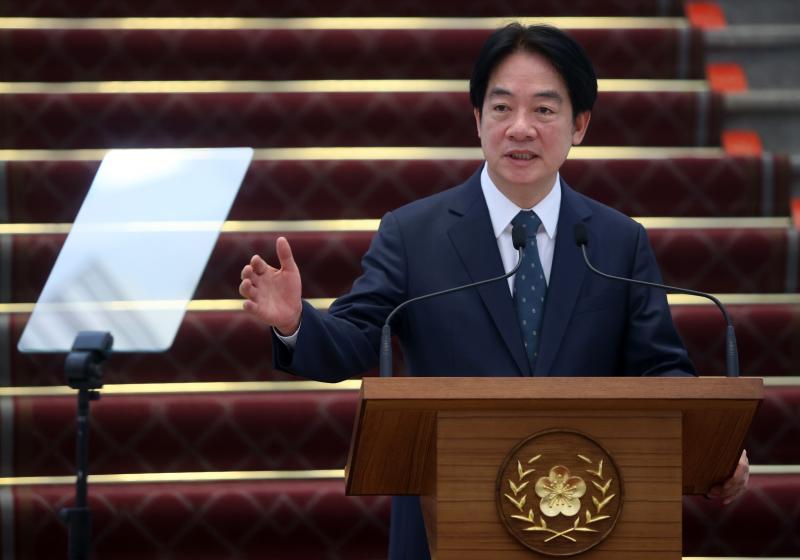President William Lai (賴清德) today formally signed a set of legislative reform bills into law, but said he would seek a constitutional interpretation and temporary injunction to try and stop the controversial changes from being enforced.
The Legislative Yuan on Friday voted down a request from the Cabinet to reconsider the bills that were passed by opposition lawmakers late last month.
The amendments to the Act Governing the Legislative Yuan’s Power (立法院職權行使法) and the Criminal Code seek to expand the legislature’s powers of investigation, imposing penalties for holding the legislature in contempt and requiring the president to take questions from lawmakers.

Photo: CNA
As the legislature turned down the Cabinet’s request for another round of deliberation, the president by law is required to accept the bills.
In his first address from the Presidential Office entrance hall as president this morning, Lai said he has already signed the bills and would promulgate them later today.
However, aside from public criticism over the legislative process that led to their passage, the amendments also risk jeopardizing the separation of powers and system of checks and balances between the branches of government, Lai said.
He therefore vowed to file for a constitutional interpretation, as well as call for a temporary injunction on their enforcement until the courts can rule on their legality.
“Our opposition to this expansion of the legislature’s powers does not mean we are opposed to legislative reform,” he said. “The legislature needs reform, but its powers should not be expanded arbitrarily.”
Most importantly, the legislature’s powers must not infringe on the people’s basic rights to privacy, trade secrets and the right to remain silent, he added.

Chinese spouse and influencer Guan Guan’s (關關) residency permit has been revoked for repeatedly posting pro-China videos that threaten national security, the National Immigration Agency confirmed today. Guan Guan has said many controversial statements in her videos posted to Douyin (抖音), including “the red flag will soon be painted all over Taiwan” and “Taiwan is an inseparable part of China,” and expressing hope for expedited reunification. The agency last year received multiple reports alleging that Guan Guan had advocated for armed reunification. After verifying the reports, the agency last month issued a notice requiring her to appear and explain her actions. Guan

GIVE AND TAKE: Blood demand continues to rise each year, while fewer young donors are available due to the nation’s falling birthrate, a doctor said Blood donors can redeem points earned from donations to obtain limited edition Formosan black bear travel mugs, the Kaohsiung Blood Center said yesterday, as it announced a goal of stocking 20,000 units of blood prior to the Lunar New Year. The last month of the lunar year is National Blood Donation Month, when local centers seek to stockpile blood for use during the Lunar New Year holiday. The blood demand in southern Taiwan — including Tainan and Kaohsiung, as well as Chiayi, Pingtung, Penghu and Taitung counties — is about 2,000 units per day, the center said. The donation campaign aims to boost

A preclearance service to facilitate entry for people traveling to select airports in Japan would be available from Thursday next week to Feb. 25 at Taiwan Taoyuan International Airport, Taoyuan International Airport Corp (TIAC) said on Tuesday. The service was first made available to Taiwanese travelers throughout the winter vacation of 2024 and during the Lunar New Year holiday. In addition to flights to the Japanese cities of Hakodate, Asahikawa, Akita, Sendai, Niigata, Okayama, Takamatsu, Kumamoto and Kagoshima, the service would be available to travelers to Kobe and Oita. The service can be accessed by passengers of 15 flight routes operated by

The Central Weather Administration (CWA) said a magnitude 4.9 earthquake that struck off the coast of eastern Taiwan yesterday was an independent event and part of a stress-adjustment process. The earthquake occurred at 4:47pm, with its epicenter at sea about 45.4km south of Yilan County Hall at a depth of 5.9km, the CWA said. The quake's intensity, which gauges the actual effects of a temblor, was highest in several townships in Yilan and neighboring Hualien County, where it measured 4 on Taiwan's seven-tier intensity scale, the CWA said. Lin Po-yu (林柏佑), a division chief at the CWA's Seismological Center, told a news conference